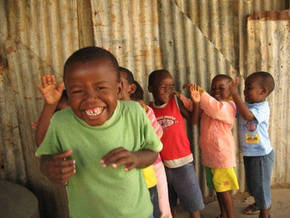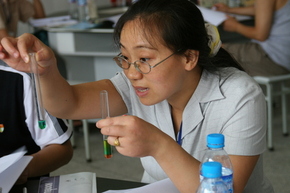I'm so pleased today to share an extraordinary organization with our Wandering Educators today. Teachers without Borders is an amazing organization whose goals are near and dear to our hearts. TWB is a non-profit organization, offering programs in 26 countries, and promotes teachers as change agents. They have formal programs, as well as a highly interactive website that offers mentoring, free tools and resources, and a dynamic global community. We'll be featuring several of TWB's programs in the next few months, so be sure to stay tuned. We were lucky enough to interview Dr. Fred Mednick, the founder of Teachers Without Borders. We talked about the organization, how it began, how TWB supports teachers, globally, pressing issues in education world-wide, and more. Here's what he had to say...
WE: Please tell us about Teachers without Borders...
FM: Teachers Without Borders is an international not-for-profit organization that advances human welfare through teacher professional development on a global scale. We have built an NGO around the notion that a global network of teachers can support local teacher leaders as key catalysts for change. The programs that have emerged reflect demand-driven needs. Examples include:
* Certificate of Teaching Mastery (CTM): Five professionally developed courses (both online and offline) designed to connect teachers to world-class content and a global network of colleagues. Enrollment and courseware are all free for TWB members. Read also about Open Educational Resources.
* TWB Toolset: A free, state-of-the-art platform that enables teachers to create communities of practice around issues, courses, and content that teachers value the most. Also included are a full social network, action groups, and courseware.
* Millennium Development Ambassadors Program: A face-to-face, online, and SMS-enabled program designed to inform teachers how to take local, practical steps to realize the eight United Nations Millennium Development Goals.
* Emergency Education: Content, media, training, and global exchange amongst teachers to ensure that all classrooms are safe and students are prepared for natural disasters. This program begins with the science of earthquakes and moves through psychosocial support for school leaders, teachers, and students.

WE: What was the genesis of Teachers without Borders?
FM: I started this organization because I realized that teachers are patronized, but not respected. At 59 million, teachers are the largest professionally trained group in the world and the key to constructive social change. They learn best from each other. They know who is sick or missing or orphaned by AIDS. But teacher training itself is divided into haves and have nots, is often unsupported or inconsequential or missing entirely. This is a huge gap.
Teachers Without Borders fills that gap by connecting teachers to information and each other – even more, but sharing their wisdom and focusing on practical on-the-ground educational projects that can be measured. Big task, I know. It seems impossible, but that is our life’s work.
I started with one project with a friend named Jihad in 2001. Sounds weird, I know, but he has become a soul brother. From there, we built a Community Teaching and Learning Center. Soon afterwards, we gathered teachers together in India, and that led to our Certificate of Teaching Mastery. Soon after that, I met Jane Goodall who became TWB’s Spokesperson. It has grown and grown and grown and now has members in 183 countries.
In a few words, the genesis was an idea – an impulse, really – to do something for teachers on a global scale. We always relied on the idea that the organization should take the form of a fabulous classroom – international and diverse leadership and distributed, local action. And now, ten years later, we can say proudly that the teachers’ voice has guided the organization.
WE: How does TWB support teachers globally?
FM: As a non-profit, organization (founded in 2000), TWB’s diverse and talented members (in 183 countries) have designed and led educational programs to address community development needs. So, the short answer to your question is this: we enable teachers to support themselves. We gather and create free and open educational resources; empower innovative and compassionate teachers and community leaders; and nurture partnerships from the village to the government. Our content is derived from the collective wisdom of our teacher members, rather than a broadcast model of right answers. Of particular note:
* Free Membership: We encourage teachers and whole organizations to sign up. No fees, no spam. By building a global teacher community, we connect education and international development.
* TWB Toolset (free for members – new version in April 2010) offers a global community, action groups, and courseware. Organizations of teachers benefit by having free access to the social network, customized groups, and courseware.

Chinese teacher participating in a science inquiry workshop in China as a part of our Emergency Education program
WE: What are the most pressing issues in global education?
FM: Allow me for a moment to debunk a prevailing myth characterizing many papers that assume all-encompassing answers for the issues facing “global education” today. Many such papers rhapsodize on the power of technology. Though we are pioneers in open-source technologies and have maintained that access to the internet for teachers allows participation and global collaboration, our answer to your question about the most pressing need in global education is this: we need to help build tools IN teachers, not necessarily FOR them. The most pressing issues we face have to do with the need for 18 million more high quality teachers. These are teachers who provide value for students when the electricity is on and when the electricity is off. Teachers such as these can find ways of inspiring children to go to school because 100 million children do not experience schooling of any sort.
Most of all, the world needs to acknowledge – first and foremost – that one size does not fit all, that teachers have wisdom, that their voice needs to be heard. Rather than focus on global education, per se, I would rather focus on the need for quality education – globally. When people learn not just about each other, but also from and with each other – then you have something.
WE: How can our Wandering Educators participate in TWB?
FM: Please encourage your teachers to sign up for free membership with TWB. It is as plain and simple as that. Your voice must be heard!
Then connect Wandering Educators or any individual members with Michael Moran, our Membership Director, at Teachers Without Borders (Michael[at]teacherswithoutborders.org)
WE: What's up next for TWB?
FM: In 2010, we’re working on several levels:
* We are seeking institutional partnerships in order to serve more teachers
* We are examining various new business models that ensure the long-term sustainability of the organization
* We are launching a community-evaluation program, TeacherPulse, which ensures that teachers and organizations can learn how to ensure their voices are heard
* We are expanding
WE: Is there anything else you'd like to share with us?
FM: Two issues: (1) Our Structure (2) A Story of Tragedy and Hope
Our Structure: When I founded Teachers Without Borders ten years ago, I decided to model its structure and approach along the lines of a fabulous classroom. As a result, I created our NGO (non-governmental organization) that resists the temptation to broadcast answers from the west. Instead, we gather up the collective wisdom of brains evenly distributed around the world and ensure that such teacher-to-teacher wisdom is shared. Rather than assembling artificial barriers to excellence, we remove obstacles. That’s what great teachers do.
As in a fabulous classroom, my organization has learned how to listen, how to question our own assumptions, and how to learn. In healthy classrooms and organizations, diversity is welcomed, leadership is distributed, play is encouraged, achievement is celebrated, and everyone matters. Most of all, the best classrooms are about hope and dignity and generosity and integrity – the kind of ineffable ingredients of success inspired by teachers who teach far more than they know. I hope that Wandering Educators understands that we are a value-driven organization and that issues such as these matter to us a great deal.
A Story of Tragedy and Hope: Two years prior to the 2008 earthquake in China, we had been working with the Ministry of Education and science teachers in Sichuan to explore new methods of teaching. Near the end of the school day on May 12th, in moments, buildings collapsed. I hurried back to China and witnessed pancaked buildings, schools collapsed around stairwells, makeshift shrines constructed of canvas over rubble and sticks serving as a meager shelter for rows of student pictures and a pile of backpacks – the litter of the lost.
Most people would respond to such devastation with the question: “What value could educators really bring outside of a charity bake-sale?”
To such cynicism, I would say: “teachers, indeed, teach far more than they know.” Teachers establish normalcy amidst catastrophe. Teachers keep their ears to the ground. Teachers can make the difference between life and death. Teachers, like students in the best of classrooms, matter.
We now work with vulnerable schools to teach about the science of earthquakes through hands-on activities. In Tajikistan, Pakistan, and China, teachers, students, and administrators understand hazard mitigation, ensure their classrooms are safe, and alter escape routes to reflect the topography of their local region (as some buildings sway and others sink).
In Haiti, teachers are communicating with us directly from the field. We are supporting our dear colleagues in Port-au-Prince with the content they need and with the support of their peers. We are doing our best to strengthen the vital connection between education and safety, between the power of a teacher and the health of a community, and between reinforced buildings and the quality of teaching all children deserve.
To my friends at Wandering Educators, thank you for your work and for the opportunity to address your wonderful questions.
WE: Thanks so very much, Fred. Your work with TWB is more than inspirational - it will change the world.
For more information, please see:
http://teacherswithoutborders.org/
All photos courtesy and copyright of Teachers Without Borders
Feature photo: This photo was taken in Nigeria at one of our mobile classrooms for
teacher training, the individuals in the photos are local teachers
partaking in the teacher training program in Nigeria as a part of our
Millennium Development Ambassadors Program (a program started and
created by Mr. Raphael Oko, our African Regional Coordinator).
